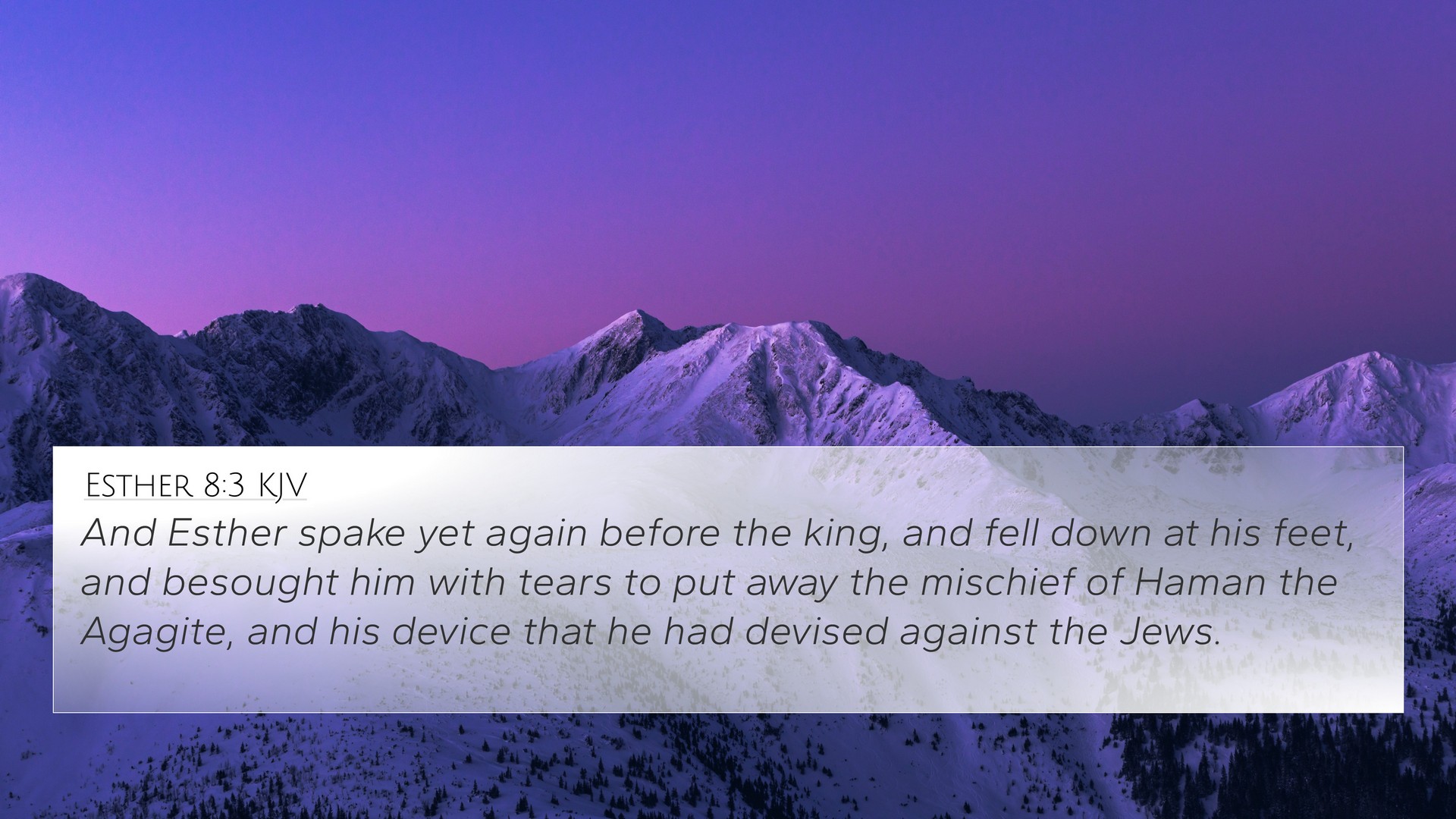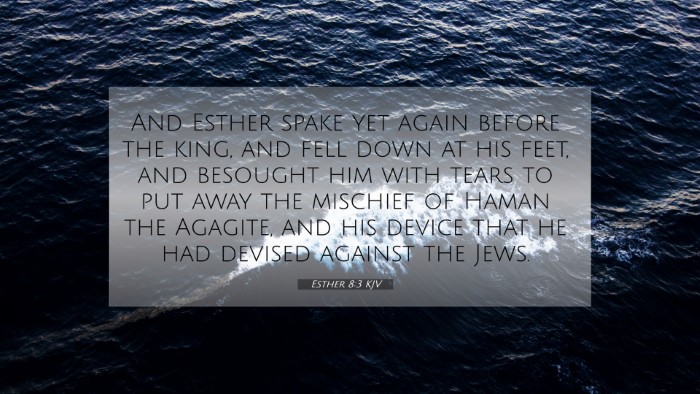Old Testament
Genesis Exodus Leviticus Numbers Deuteronomy Joshua Judges Ruth 1 Samuel 2 Samuel 1 Kings 2 Kings 1 Chronicles 2 Chronicles Ezra Nehemiah Esther Job Psalms Proverbs Ecclesiastes Song of Solomon Isaiah Jeremiah Lamentations Ezekiel Daniel Hosea Joel Amos Obadiah Jonah Micah Nahum Habakkuk Zephaniah Haggai Zechariah MalachiEsther 8:3 Similar Verses
Esther 8:3 Cross References
And Esther spake yet again before the king, and fell down at his feet, and besought him with tears to put away the mischief of Haman the Agagite, and his device that he had devised against the Jews.
Uncover the Rich Themes and Topics of This Bible Verse
Listed below are the Bible themes associated with Esther 8:3. We invite you to explore each theme to gain deeper insights into the Scriptures.
Esther 8:3 Cross Reference Verses
This section features a detailed cross-reference designed to enrich your understanding of the Scriptures. Below, you will find carefully selected verses that echo the themes and teachings related to Esther 8:3 KJV. Click on any image to explore detailed analyses of related Bible verses and uncover deeper theological insights.
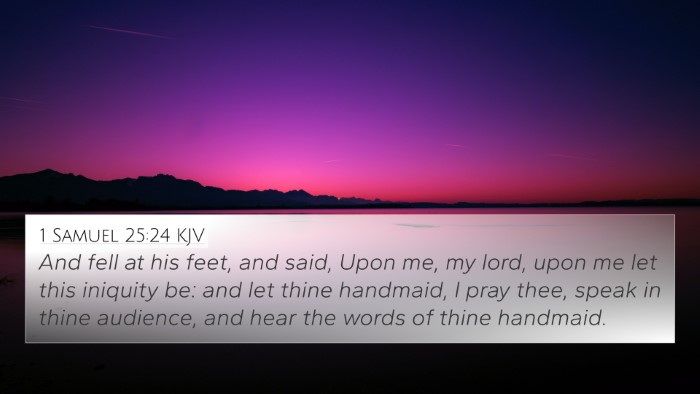
1 Samuel 25:24 (KJV) »
And fell at his feet, and said, Upon me, my lord, upon me let this iniquity be: and let thine handmaid, I pray thee, speak in thine audience, and hear the words of thine handmaid.
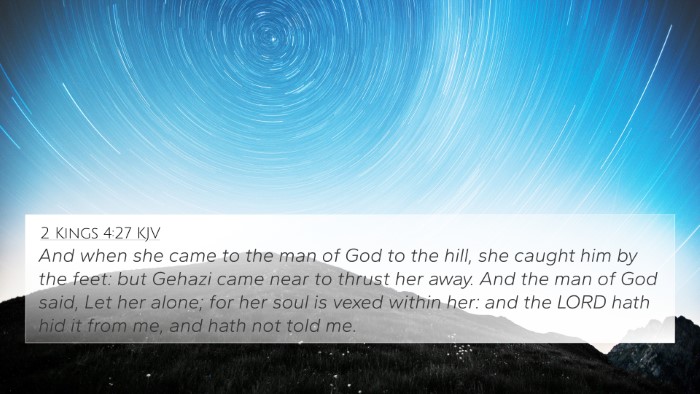
2 Kings 4:27 (KJV) »
And when she came to the man of God to the hill, she caught him by the feet: but Gehazi came near to thrust her away. And the man of God said, Let her alone; for her soul is vexed within her: and the LORD hath hid it from me, and hath not told me.
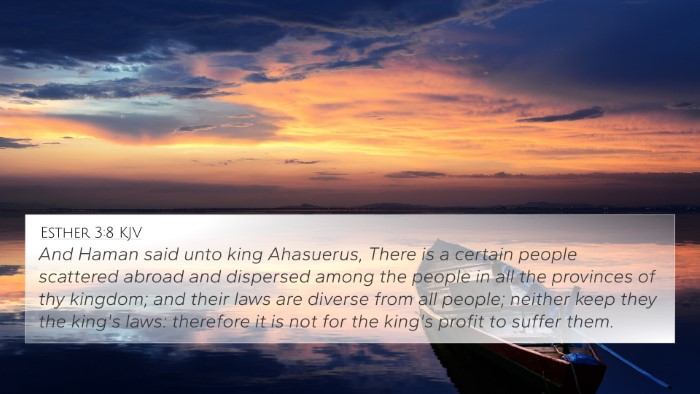
Esther 3:8 (KJV) »
And Haman said unto king Ahasuerus, There is a certain people scattered abroad and dispersed among the people in all the provinces of thy kingdom; and their laws are diverse from all people; neither keep they the king's laws: therefore it is not for the king's profit to suffer them.

Esther 7:4 (KJV) »
For we are sold, I and my people, to be destroyed, to be slain, and to perish. But if we had been sold for bondmen and bondwomen, I had held my tongue, although the enemy could not countervail the king's damage.

Hosea 12:4 (KJV) »
Yea, he had power over the angel, and prevailed: he wept, and made supplication unto him: he found him in Bethel, and there he spake with us;
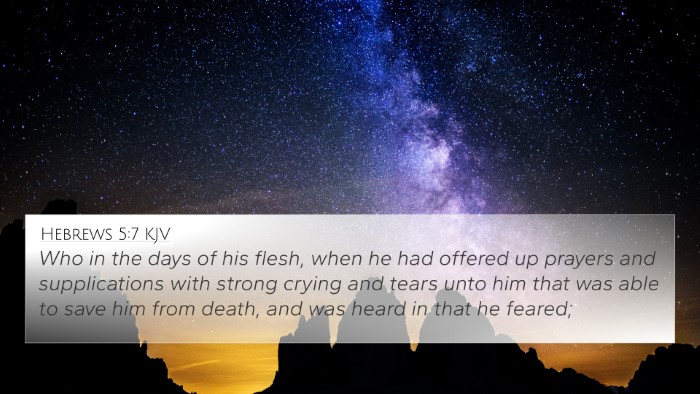
Hebrews 5:7 (KJV) »
Who in the days of his flesh, when he had offered up prayers and supplications with strong crying and tears unto him that was able to save him from death, and was heard in that he feared;
Esther 8:3 Verse Analysis and Similar Verses
Understanding Esther 8:3
Esther 8:3 states: "And Esther spake yet again before the king, and fell down at his feet, and besought him with tears to put away the mischief of Haman the Agagite, and his device that he had devised against the Jews." This verse captures a poignant moment in the Book of Esther, where Queen Esther intercedes for her people, the Jews, seeking to avert destruction imposed by Haman, an enemy of the Jewish nation.
Summary of Esther 8:3
The act of Esther falling at the king's feet and imploring him with tears illustrates her desperation, courage, and the intensity of her love for her people. This plea is significant, highlighting the power of intercession and the grave consequences that could arise from the king's decisions. Esther’s approach also emphasizes the personal relationship between Esther and King Ahasuerus, as she boldly advocates for a marginalized population facing genocide.
Commentary Insights
Matthew Henry's Commentary
Matthew Henry emphasizes the importance of Esther's humility and her emotional appeal. He notes that the sight of a person in distress can evoke compassion, and Esther, by showing such grief, captures the king's attention. Her act demonstrates both her leadership qualities and her willingness to confront danger in order to protect her people. Henry highlights that true leadership often entails self-sacrifice and standing for justice.
Albert Barnes' Notes
Albert Barnes points out the strategic nature of Esther's plea and the role of divine providence. He interprets her falling down before the king as a submission that signifies both desperation and a deep sense of responsibility for her people. Barnes notes that Esther's actions were a critical turning point in the narrative, showcasing how God can use individuals to accomplish great deliverance. Her faithfulness and courage amidst peril serve as a testament to God's sovereignty in the unfolding events.
Adam Clarke's Commentary
Adam Clarke provides an analysis of the broader implications of Esther’s actions, noting the significance of her nationality and status. He emphasizes the emotional weight of Esther's pleas and how they represent the plight of the Jews at that time. Clarke also alludes to themes of justice and mercy, suggesting that Esther’s appeal is not just about her safety but about the survival of an entire nation. He reflects on the ethical duties of those in positions of power and influence.
Connections and Cross-References
Esther 8:3 is not only pivotal within its own narrative but also resonates with various themes and verses found throughout the Bible. Below are key cross-references that enrich the understanding of Esther 8:3:
- Esther 4:16 - Esther commands fasting and prayer, invoking a plea for divine intervention.
- Exodus 17:11 - The theme of intercession as Moses’ raised hands signified Israel's victory in battle.
- 1 Samuel 15:33 - Haman, as an Agagite, connects Esther’s current threats to Israel’s past conflicts with Amalek's king, Agag.
- James 5:16 - The power of prayers in interceding for others is emphasized, paralleling Esther's role.
- Matthew 5:14-16 - Believers are to be lights in a dark world, reflected in Esther's bravery and visibility before the king.
- Romans 8:31 - Assurance of God's support in the face of opposition, similar to Esther's advocacy for the Jews.
- Hebrews 4:16 - The invitation to approach God’s throne with confidence parallels Esther's approach to the king.
The Template for Intercession
Esther models what effective intercession looks like, demonstrating the importance of emotional authenticity, strategic action, and the recognition of divine timing. Her act of falling before the king signifies total dependence on his mercy, a reminder of our need for grace in approaching authority. These lessons are invaluable for anyone studying the art of prayer, advocacy, and leadership within a biblical context.
Conclusion
Esther 8:3 holds profound lessons not only about the historical context of the Jewish people but also about the nature of intercession, the struggle against evil, and the hope for justice. As one reflects on Esther’s plea, it serves as a powerful reminder of how individuals can impact the destiny of their communities through courageous action and heartfelt prayer.
Further Study Tools
For those interested in exploring the rich tapestry of connections between Bible verses, consider utilizing the following tools and methods for cross-referencing:
- Bible Concordance
- Bible Cross-Reference Guide
- Cross-Reference Bible Study
- Bible Chain References
- Comprehensive Bible Cross-Reference Materials
